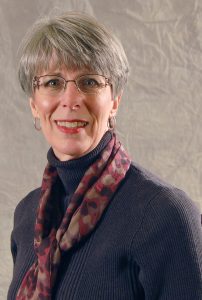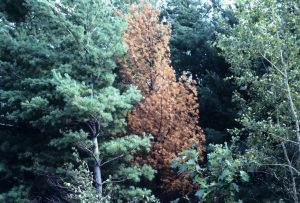The Wisconsin Department of Natural Resources Division of Forestry has two Limited Term Employment (LTE) positions open for applications. One position is an Urban Forest Assessment Outreach Specialist with the Urban Forestry team and the other is an Urban Forest Inventory Specialist with the Forest Products Services team. Each of these positions is a half-time appointment, and both are stationed out of Central Office in downtown Madison. Continue reading “Accepting applicants for urban positions”
Archives
Urban Forestry supports health care research
The University of Illinois is taking the lead on a three-year research project exploring urban forestry’s effects on health care spending. The project will be the first to focus specifically on urban forestry’s economic return on investment. Health expenditures of over 4 million people will be analyzed with LiDAR (Light Detection and Ranging) canopy coverage. The project will also result in a free, online tool that can be used to estimate a community’s return on investment for their urban forest.
For more information contact Ellen Clark (EllenA.Clark@Wisconsin.gov), Urban Forestry Communication Specialist, at 608-267-2774.
DNR attends Partners in Community Forestry Conference
The DNR Urban Forestry program sent Laura Lorentz, UF Policy and Partnership Specialist, and Sara Minkoff, UF Specialist, to the annual Partners in Community Forestry Conference convened by the Arbor Day Foundation. Attending this national conference provided Laura and Sara a unique opportunity to meet other urban forestry professionals representing local, state and federal governments as well as non-profit organizations from across the country (and one from the UK!) and share ideas and resources with the goal of enhancing urban and community forestry initiatives in Wisconsin. Some of the sessions they attended included topics such as the role of urban forestry in green infrastructure, environmental justice and equity in urban forestry, development and diversification of the urban forestry workforce, the relationship between urban trees and health, and demonstrated uses of urban forest inventory data to make positive impacts on the ground. Click here to learn more about the Partners in Community Forestry Conference.
For more information contact Ellen Clark (EllenA.Clark@Wisconsin.gov), Urban Forestry Communication Specialist, at 608-267-2774.
EAB mitigation grants support communities
The Bay-Lake Regional Planning Commission (RPC), in partnership with WI DNR and two other Wisconsin RPCs, awarded $82,450 to nine Wisconsin communities for projects to mitigate the impacts of Emerald Ash Borer (EAB). Grant funds will support planting nearly 700 diverse trees to help local governments prepare and recover from EAB. The grant awards ranged from $2,400 to $20,000, with recipients providing at least a 25% match of the total project. This funding was made available through a U.S. Forest Service Great Lakes Restoration Initiative (GRLI) grant received by Bay-Lake Regional Planning Commission earlier this year.
For more information contact Ellen Clark (EllenA.Clark@Wisconsin.gov), Urban Forestry Communication Specialist, at 608-267-2774.
EAB detection continues to grow in urban areas
EAB is an invasive pest that continues to expand and affect more communities in Wisconsin. EAB affects ash trees, which are prevalent in Wisconsin’s urban forests. Communities have been, and continue to create plans to mitigate EAB infestation. Currently, there are 268 communities with known EAB detections. Unfortunately, Wisconsin has far surpassed the former record for most municipal detections in a single year, 86 this year versus 52 in 2015. Continue reading “EAB detection continues to grow in urban areas”
Annual Urban Forestry conference announced
The Wisconsin Arborist Association (WAA) teams up with the Wisconsin Department of Natural Resources to present the WAA/DNR Annual Urban Forestry Conference, Healthy Benefits to Enriching Your Arboriculture and Urban Forestry Knowledge. This three-day conference is intended for professional arborists, community foresters, nursery professionals, park and recreation directors and staff, tree care workers, landscape architects, green industry professionals, community administrators, volunteers, and students to come together with top researchers and educators to learn the latest in research, innovations and industry developments and issues. ISA Continuing Education Unit (CEU’s) credits and Certified Treecare Safety Professional (CTSP) credits are available for qualifying presentations. Continue reading “Annual Urban Forestry conference announced”
Financial Specialist retires after 35 years
 Where one chapter ends another begins. Su DaWalt, Urban Forestry Financial Specialist, is retiring from her work at Wisconsin DNR. In this role her primary responsibility was to coordinate the policy and implementation of our Urban Forestry grant and financing programs. She has implemented many process improvements to streamline and document the grant process for staff and potential applicants. She helped document and share other potential funding sources. Additionally, she worked with numerous partners, grant applicants and staff to improve, implement and train them in the various processes and materials. Su will be missed, but we know she will do amazing things in her retirement. Continue reading “Financial Specialist retires after 35 years”
Where one chapter ends another begins. Su DaWalt, Urban Forestry Financial Specialist, is retiring from her work at Wisconsin DNR. In this role her primary responsibility was to coordinate the policy and implementation of our Urban Forestry grant and financing programs. She has implemented many process improvements to streamline and document the grant process for staff and potential applicants. She helped document and share other potential funding sources. Additionally, she worked with numerous partners, grant applicants and staff to improve, implement and train them in the various processes and materials. Su will be missed, but we know she will do amazing things in her retirement. Continue reading “Financial Specialist retires after 35 years”
Conifers provide urban forests many benefits

Trees dressed in tinsel, ornaments and lights are common in households around the world over the holiday season. While conifers are known for decorating homes over holidays there are many other benefits they provide as urban trees in yards and along streets. ISA released an article regarding these benefits. Continue reading “Conifers provide urban forests many benefits”
Consider contract growing this year
Contract growing affords opportunities and benefits for both the nursery and the municipality – species, quantity, quality and diversity – one stop shopping.
Contract growing is a practice whereby municipalities work with nurseries to create a long-term relationship for growing a desired species of tree to very exact standards. As the name implies, a contract is put in place between municipalities and individual nurseries to ensure, in advance, a certain quality, quantity and type of tree will be grown specifically for the municipality. Continue reading “Consider contract growing this year”
Urban Forestry grants have been announced
Thirty-three communities, nonprofit groups, and counties will share $487,578.97 in 2017 state grant dollars to promote and sustain urban forest resources in Wisconsin.
Continue reading “Urban Forestry grants have been announced”
